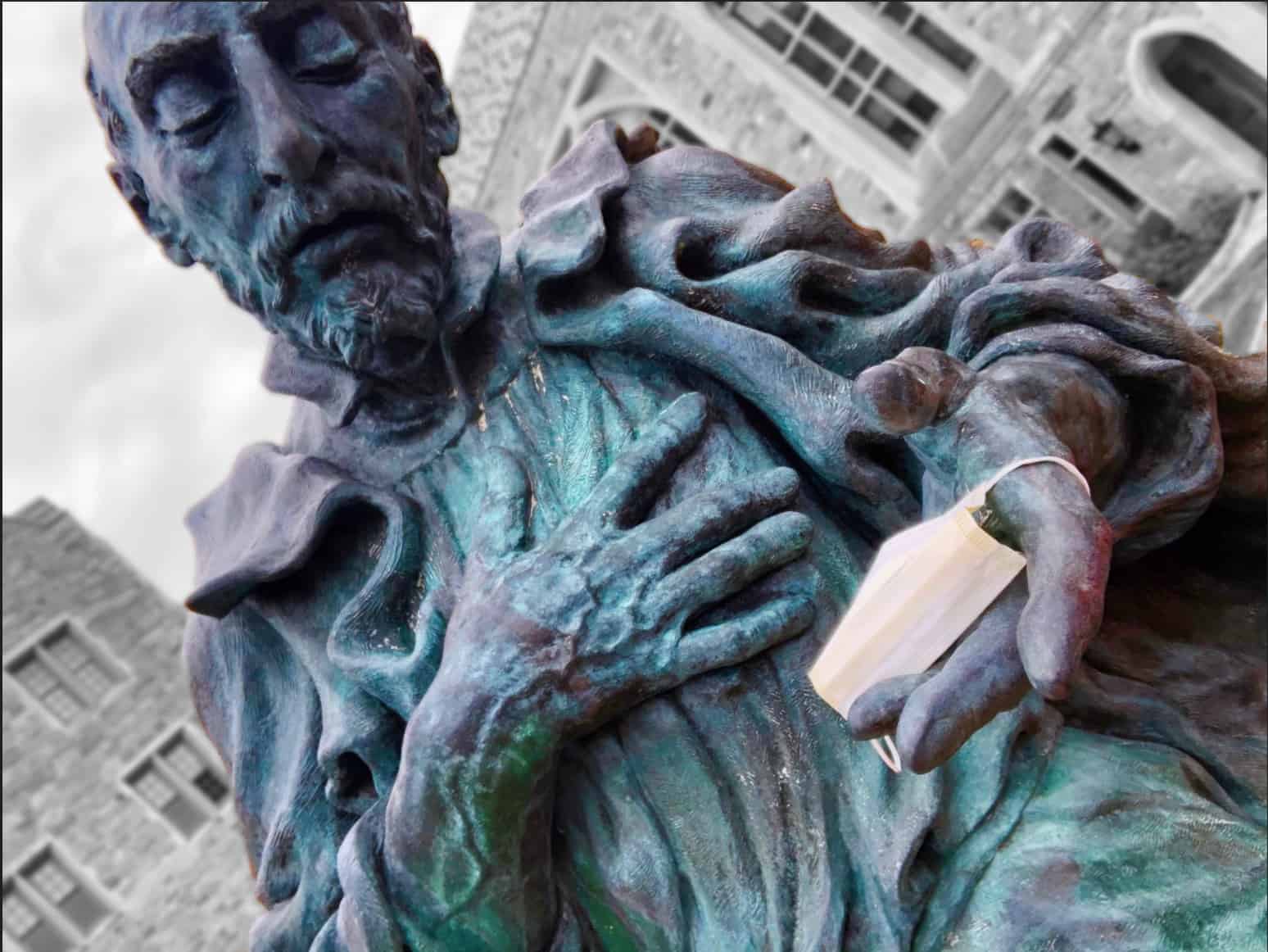The coronavirus which once was so far off, seemingly locked away in a then-unknown Wuhan Province of China, has now not only moved much closer geographically, but has also moved into our psychological, emotional, and spiritual worlds. As I’ve been sitting with all of this and praying about it, I have found myself drawn to three different groups of people:
- People who are infected with the coronavirus.
- People who are most at risk of being infected with it.
- People who are afraid.
I think the first thing to notice is that all three of these groups are vulnerable in some way or another, whether because of being sick, at risk of being sick, or afraid of being sick. Since all three are vulnerable, they seem to be groups of people that Jesus wants us to be concerned about in a very deep and intentional way. So at this point in our history, let us all remember that the present is a moment crying out and longing for the healing power of Christ.
A therapist once told me, “The problem with being vulnerable is then you’re vulnerable.” There’s some deep wisdom in that tautology. For me, when I’m vulnerable and my defenses are lowered, I find myself a prime target for anxiety and fear. When I think my own survival is at stake, the fight-or-flight instinct kicks in, and I’m not at my best. So while this is a moment that deeply needs Christ, it might also be a moment we have the hardest time witnessing him or even finding the courage to be his witnesses.
In a moment like the present one, we can rely on our faith and religious formation to help us.
Here are a few concrete ideas:
God Speaks Words of Calm.
This may be the most important bit of spiritual wisdom St. Ignatius has to offer in his “Rules for Discernment.” He tells us that for people who are earnestly trying to improve their lives—people who are striving to do better in the spiritual and moral life—God never uses fear or anxiety to get our attention.1 If you’re here reading this piece, I’d be willing to bet that you’re a good person trying to get better. If that’s the case, then the crippling fear or anxiety that you might feel, though it is real and needs to be recognized and named, is not coming from God. When you feel overcome by fear or anxiety, ask yourself this question: “Is this how God speaks to me?” For Ignatius, God speaks words of peace, calm, expansiveness, open-heartedness, and magnanimity. Ignatius calls this feeling “consolation.”
Love Your Neighbor. Wash Your Hands.
This might seem like a bizarre suggestion for living out our faith, but stay with me. I might think that I am at low risk of getting the coronavirus or even if I get it, it won’t be so bad for me and that is probably true. That perspective might lead me to dismiss the recommendations of epidemiologists at the WHO and the CDC who are very strongly advocating for things like frequent hand washing, use of hand sanitizer, etc. But when I’m quick to dismiss these cautions because there is no harm to me, I am taking a fundamentally anti-Christian approach to the world.
So while I don’t know how frequently washing my hands for at least 20 seconds, or using hand sanitizer, or other activities help, you bet I’m doing them. I live with several Jesuits who have compromised immune systems or who are in their eighties, so I am doing what I can to protect them even though it causes me some inconveniences. Who are the vulnerable people in your life? We need to remember that there really are people who are at risk in our communities: elderly family members, the person next door with a respiratory illness, a pregnant friend, a coworker being treated for cancer whose chemotherapy leaves them immunocompromised, etc. It seems that right now part of “love your neighbor” means washing your hands.
Take the Extra Step. Reach Out to the Vulnerable.
Here, I mean the vulnerable in all three groups: who’s already sick, who’s most at risk of getting sick, and who is afraid of getting sick. Since this disease is now a global pandemic according to the WHO, it’s possible that some of you reading this know someone with the virus. I mean, Tom Hanks has it now, so anything is possible. But also, think of all the people you know who are worried about getting this virus. I think we all know people who are afraid—just look at the stock market in the past few days. Helping to keep them safe and healthy is important. But take the extra step. Reach out and ask how they are doing. Give a word of comfort. Remind them that you are praying for them and thinking about them.
Gather in Groups of Two or Three to Pray.
For some of us, we suddenly have a lot more free time on our hands. In-person classes have been cancelled at many schools, some businesses are closing or limiting hours, others are mandated to work from home, and some are medically quarantined. That can certainly give us some time for catching up on Netflix, but we shouldn’t forget that Jesus tells us that “where two or three are gathered together in my name, I am in the midst of them.” (Matthew 18:20) Find a couple of friends and pray the rosary together; read some scripture like the daily readings and talk about it; pray the Liturgy of the Hours. Be together in the name of Jesus.
Turn to the Sacraments.
Even though in many places communal celebrations are being limited or even cancelled (such as in the Archdiocese of Seattle), this is a time for a deep recommitment of our Church to the Sacraments. In the Sacraments we encounter the Living God and the Body of Christ in privileged, graced ways. Be fed by Christ at the table of the Eucharist to give you strength to be his body in the world; return with your whole heart to him in Reconciliation to heal your soul; surrender your vulnerable, anxious, even sick body to him in the Anointing of the Sick for healing.
If you are in a place where the Sacraments themselves aren’t currently being celebrated communally, or if you find yourself in quarantine or simply in a place of marked social distancing, then let your sacramental imagination reconnect you to Christ and the Church. Even though holy water fonts might be empty, let your morning shower help you commit yourself to your baptism; offer your morning toast to God as a sacrifice of thanksgiving; tell someone you’re sorry in order to reconnect with them. This is what it means to live a sacramental life.
*****
These are a few suggestions. If you have others, leave them in the comments.
Get plenty of sleep and drink plenty of fluids, take your meds, wash your hands, use hand sanitizer. But also let your faith in Jesus help you heal your soul and the souls of others as well.
- Sure there are people who are “moving from bad to worse,” as St. Ignatius would say, but I doubt many of them are ending up on TJP or Googling about how their faith can help them during this pandemic. ↩


